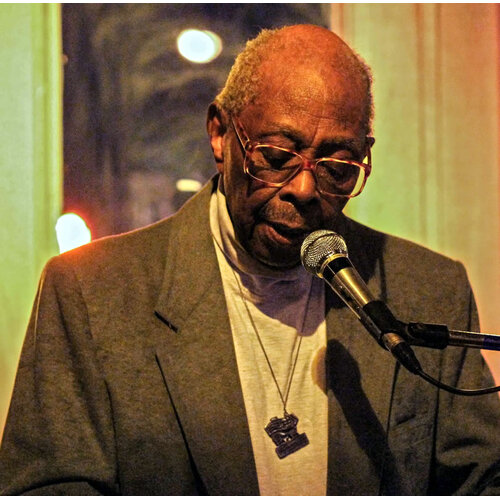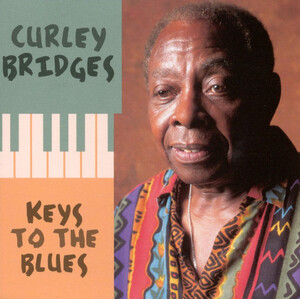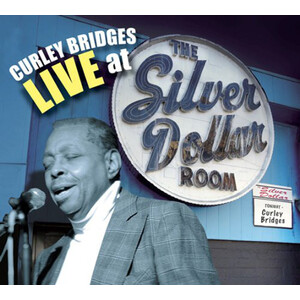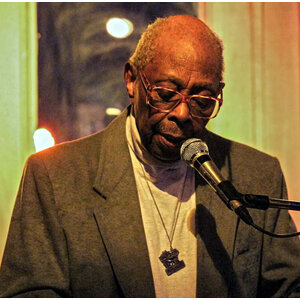Bridges, Curly
Websites:
http://torontobluessociety.com/curley-bridges/, https://tma149.ca/portfolio-item/curley-bridges/
Origin:
Fuquay Marina, North Carolina - Washington, DC, USA - Toronto, Ontario - Barrie, Ontario
Biography:
Most blues lovers know that it was Big Mama Thornton in 1953, and not Elvis Presley in 1956, who first recorded “Hound Dog”. But few are aware that it was a guy named Curley Bridges who first turned Thornton’s grinder into an uptempo jump number, or that Curley Bridges has been playing and living around Toronto for some 40 years. R&B chronicler and collector Bill Munson has been following Curley’s career since the early days and offers this profile.
Curley Bridges recorded “New Hound Dog” in 1954 as lead singer with Frank “Dual Trumpeter” Motley and his Motley Crew, a jump blues band based in Washington D.C. Born in Fuquay Marina, North Carolina in 1934, Bridges had moved as a child to Washington, where he soon developed a love for blues and R&B music.
“Everybody was my influence: Fats Domino, Count Basie, Duke Ellington – everybody”, Bridges now recalls. “But the guys that really inspired me were [boogie-woogie pianists] Albert Ammons and Pete Johnson. The things they were doing with their left hands!”
In 1953, Bridges ` talents as pianist and singer (and occasional drummer) led him to Frank Motley, who by then had already recorded for Specialty and other important labels, and was putting together a small band for some dates in the area. The new group proved popular and nabbed a spot on a wider east coast circuit (Washington-Philadelphia-Toronto-Montreal-Boston-Washington).
For whatever reason, the Motley Crew found especial favour in Canada, which they visited for the first time in 1955. In Toronto, the Holiday Tavern offered the popular visitors engagements of up to six weeks – much less than the six-month bookings at Montreal’s Esquire Show Bar, but surely rating as a happy circumstance for any itinerant musician.
Motley CrewAn old publicity shot of Frank Motley and his Motley Crew. The American R&B band lived here in Toronto and played regularly at The Holiday Tavern during in the 50s & 60s. The band featured (l. to r.), Jimmy Butler (at drums), Curley Bridges (with trombone), Frank Motley (with his trademark two trumpets), King Herbert (sax), Larry Ellis (with bass). (photo courtesy Bill Munson)
Noting both the group’s popularity and Presley’s current success with “Hound Dog”, Quality Records released “New Hound Dog”/”Diggin’ In The Ground” in 1956. The A-side featured Bridges’ frantic rearrangement of the Thornton hit, which the Crew had recorded for release in the U.S. in 1954. Quality released three more Motley Crew 45s over the next couple of years, and other labels followed suit. All told, the group had perhaps twenty 45s on a dozen labels on both sides of the border, plus an album, Swingin’ and Rockin’. Bridges sang lead on most of the sides (though the group’s only hit, “Any Other Way”, was sung by Jackie Shane).
Bridges’ magnificent full voice was put to good use on a wide range of material: a rousing version of Big Joe Turner‘s “Honey Hush”, a hopping “Tennessee Waltz”, an impressive doo-wop, “I Feel So Good”, and a variety of other cover tunes and originals. Perhaps most effective as a musical category were a number of poignant blues ballads, notably “What Can I Do”, sung as by a black U.S. soldier forced to say good-bye to his white lover: “Until the world can understand, I won’t be able to be your man”.
In the early ’60s Bridges and the rest of the Motley Crew chose Toronto as their new home base, for the usual mixture of reasons – love and money among them. Here, along with Ronnie Hawkins and the Hawks and Joe King and the Zaniacs, they came – in Frank Motley,s words – to “own Yonge Street”, drawing enthusiastic audiences to the many clubs that then lined “the strip”,.
Given the popularity of the Motley Crew, surprisingly little has been made of the great talent possessed by Curley Bridges in the three decades since the group split up in late 1966. The only exceptions are a guest appearance as organist on Jackie Shane’s live album from 1968, and the terrific Chip Dip album recorded by Frank Motley and the Bridge Crossing in 1972.
On Chip Dip, Bridges plays organ and sings “Rock And Soul” (a Fats Domino rewrite), “Crying All Alone” (a new version of one of those wonderful original blues ballads of the early ’60s), Lee Dorsey‘s “Ya Ya”, and Rufus Thomas‘s “Walking The Dog”. The album is most definitely worth tracking down, with guitarist James Burney and drummer Jimmy Payne playing up a storm throughout. (Payne now leads the Calgary-based House of Payne.)
Since then there have been no records at all, and little recognition outside of the area up around Barrie (where Curley lives and holds sway every Tuesday night at Ruanne’s downtown) and Orillia (where he recently played the second Orillia Spring Blues Festival). Andrew Galloway of Electro-Fi Records reports that Curley’s closing set in Orillia included a powerful version of Lowell Fulsom‘s “Reconsider Baby”, along with “Shake, Rattle and Roll”, “I Got My Mojo Working” and slow blues arrangements of “Stand By Me” and “Stormy Weather”.
For those of us in Toronto, our chance to catch Curley Bridges comes when he plays the Heineken Soul ‘n’, Blues Festival at Harbourfront (Brigantine Room, July 19, 6:30-7:30pm). This should be a real treat!
-Bill Munson
Curley Wilson Bridges was an American electric blues, rock-and-roll, and rhythm-and-blues singer, pianist and songwriter.
Bridges was born in Fuquay-Varina, North Carolina. His father, who befriended Fats Waller, was a farmer and part-time musician, and his mother, Ophelia,[1] played the organ at their church. Bridges saw Joe Turner and Louis Jordan performing in nearby Raleigh, North Carolina, giving him early inspiration, and he sang at church. Following his conscription into the U.S. Army at the age of 19, Bridges heard Albert Ammons, Pete Johnson and Piano Red playing the piano and was determined to master the instrument. After leaving the army on medical grounds, Bridges moved back to Washington, D.C., his home since childhood, and worked as a cook.
Bridges often lingered backstage at the Howard Theatre, where he met and befriended Billie Holiday. In 1953, he and the trumpet player Frank Motley, Jr., formed the Motley Crew. Bridges performed with this group until 1966; he was the lead vocalist and played the piano and, on occasion, the trombone or drums. In 1954, they recorded an upbeat version of the song “Hound Dog”, which was renamed “New Hound Dog” and issued by Big Town Records, billed as by Frank “Dual Trumpeter” Motley & His Crew (with vocal by Curley Bridges) (Big Town 116). The track was arranged by Bridges. Several singles followed, including “A Prayer of Love” (1961),[6] “Are You Satisfied” (1964), “Crying All Alone,” “Honey Hush,” “Tennessee Waltz,” “Everybody Wants a Flattop,” “Any Other Way,” and “Rock and Roll Gotta Beat,” which were issued on various American and Canadian record labels. The outfit played across North America over the years, including taking part in a United Service Organizations (USO Show) in 1959. In 1961, Bridges received a royalty check for $62.20, which he claimed to be the only royalty payment he received until the turn of the millennium. The following year Bridges and Motley contributed to Jerry Lee Lewis’s album Rockin’ with Jerry Lee Lewis.
By 1966, the band had relocated to Toronto. Bridges left the group later that year. He recruited King Herbert and Frank Pelly from his former band, and they performed as the Rounders in Northern Ontario.
In 1968, Bridges played the electric organ on the album Jackie Shane Live! Bridges then fronted another band, Bridge Crossing, which collaborated with Frank Motley to record Chip Dip (1972). He continued to perform before and after moving to Barrie, Central Ontario, in 1981. He and other local musicians spent time as the house band at the Ruanne’s nightclub in Barrie, led by Gerry Markman, and Bridges performed as a solo act and with the Fig Leaf Jazz Band.
He appeared in 1997 at Toronto’s Harbourfront Soul ‘n’ Blues Festival. In 1999, Bridges recorded his first solo album for the Electro-Fi Records label, Keys to the Blues. It contained his cover versions of songs such as “Honey Hush”, “Reconsider Baby”, “I’m Tore Down”, “Rock Me Baby”, “Thank You Pretty Baby”, “Every Day I Have the Blues” and “Since I Met You Baby”. His second album, Mr. Rock N Soul, was released in October 2001, and included Bridges version of Fats Domino’s “My Girl Josephine”. Pat Carey played saxophone on the album. Curley Bridges Live at the Silver Dollar Room was issued in 2009 to celebrate his 75th birthday.
In August 2005, Bridges performed at the Edmonton’s Labatt Blues Festival.
In 2011, he won the Excellence in the Arts Award at the Barrie Arts Awards. Bridges performed to a sell-out crowd in March 2014, to celebrate his 80th birthday.
Bridges died in the Hospice Simcoe in Barrie, from cancer on November 27, 2014, aged 80. His remains were donated to the University of Toronto for medical research
Albums
1999 Keys to the Blues Electro-Fi Records
2001 Mr. Rock N Soul Electro-Fi Records
2009 Curley Bridges Live at the Silver Dollar Room Electro-Fi Records
2010 Electro-Fi Records Presents Blues Piano-Rama Electro-Fi Records




